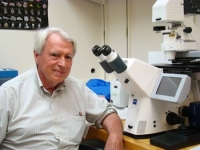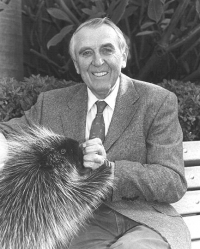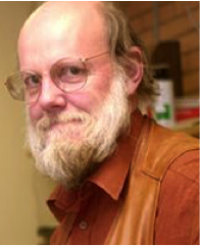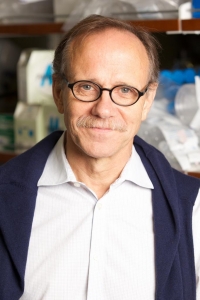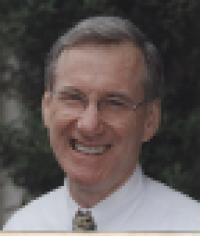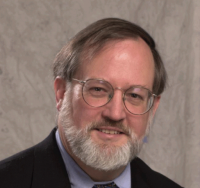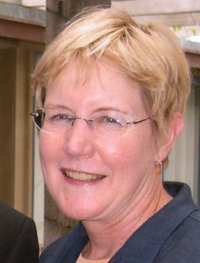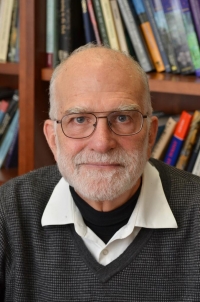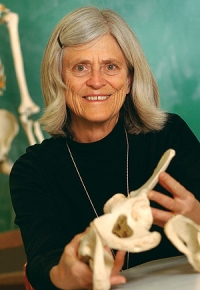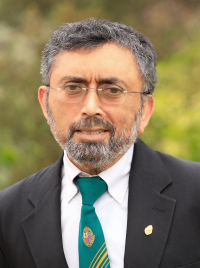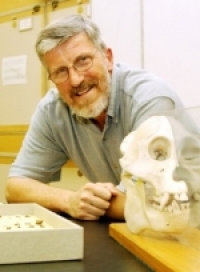Understanding Human Origins: Implications for Medicine
Biographical Sketches: Speakers
California Institute of Technology
John Allman is the Frank P. Hixon Professor of Neurobiology, California Institute of Technology. Evolution of the brain and behavior in primates. The anatomy and physiology of the visual system in primates. The role of frontoinsular and anterior cingulate cortex in emotion and cognition. Functional magnetic resonance imaging of economic decision-making. Recent book: Evolving Brains, Scientific American Library/WH Freeman, 2000.
University of California, San Diego (retired)
Benirschke, among the earliest faculty at UC San Diego School of Medicine, famously combined interests in human and animal biology, advancing comparative pathology and the preservation of endangered species.
Kurt Benirschke, whose medical and scientific interests spanned the animal kingdom and likely saved more than a few species from extinction, passed away September 10, 2018. He was 94.
“Dr. B” or “KB”, as he was affectionately called, joined the faculty of University of California San Diego School of Medicine in 1970, shortly after the school opened. He served nearly a quarter of a century as a noted pathologist, geneticist and expert on the placenta and reproductive systems of humans and myriad mammalian species. He became internationally known for his successful efforts to create the world’s first “frozen zoo.”
Benirschke was born in the small northern German town of Glückstadt in 1924. He received his medical degree from the University of Hamburg in 1948 and immigrated to the United States in 1949.
During an internship at Holy Name Hospital in Teaneck, N.J., Kurt met his future wife, Marion, who was a nurse at the hospital. Benirschke received residency training in pathology at Harvard Medical School and, in 1955, became a pathologist at Boston Lying-in Hospital, one of the first maternity hospitals in the United States, now part of Brigham and Women’s Hospital. It was there that he became particularly interested in the biology of the placenta and reproduction.
From 1960 to 1970, Benirschke served as chair of the Department of Pathology at Dartmouth Medical School, further exploring placental pathology and comparative reproductive pathology. He investigated how viruses are passed from mother to fetus and the phenomenon of chimerism, in which an individual possesses two or more complete sets of genetic material. He also explored why mules are sterile and twinning in armadillos and marmoset monkeys, which led to a lifelong love affair with South America and its wildlife, particularly the tagua or Chacuan peccary in Paraguay.
In 1970, Benirschke was invited to join the faculty of UC San Diego School of Medicine and moved his family to San Diego. (UC San Diego had just debuted its first class of students in 1968.) He established a genetics laboratory, ran the autopsy service for the university hospital and almost immediately became an influential voice and figure in the world of animal conservation.
In August of 1970, Benirschke became involved with the San Diego Zoo, lobbying for the creation of a novel “cell bank” to preserve the eggs, sperm and other tissues of endangered species. “A number of mammals and other species are going to become extinct in the next decades, all efforts notwithstanding,” Benirschke wrote to leaders at the San Diego Zoological Society. “This is of very great concern to me and I hope that we can somehow proceed. I am going to summarize what I can contribute to the subject.”
Benirschke believed the San Diego Zoo would be an ideal home for a so-called “frozen zoo,” a repository containing reproductive tissues from animals around the world, from rhinos and whales to apes and antelopes, stored at temperatures approaching minus -200 degrees Fahrenheit. At the time, there was no technology yet available to effectively thaw, study and revive frozen eggs and sperm, but Benirschke, quoting American historian Daniel Boorstin, said “You must collect things for reasons you don’t yet understand.” His words would prove prophetic as technologies subsequently emerged, advancing conservation science.
In 1979, the Zoological Society established CRES, the Center for Research of Endangered Species, which Benirschke led until 1985, when he joined the Zoo’s board of directors. Today, the renamed San Diego Zoo Institute for Conservation Research is the largest of its kind, with more than 10,000 living cell cultures, oocytes, sperm and embryos representing nearly 1,000 taxa, some extinct and many severely endangered.
Benirschke moved freely between human medicine and animal medicine, considering lessons learned to be universal. A 1984 tribute book to Benirschke, written by 50 of his colleagues, is titled “One Medicine.” Kurt was always busy: teaching courses, conducting research and lecturing around the world. From 1976 to 1978, he served as chair of the Department of Pathology at UC San Diego School of Medicine and played a key role in the creation and success of the Center for Academic Research and Training in Anthropogeny (CARTA).
He formally retired as professor emeritus in 1994 but remained active as a consultant to the autopsy service, in the field overseeing a breeding facility in Paraguay for a newly discovered species of peccary and in publishing scholarly papers.
Since 1994, the departments of Pediatrics and Obstetrics, Gynecology & Reproductive Sciences have presented the annual Kurt Benirschke Lecture, featuring international experts on topics relevant to biology and procreation.
Benirschke produced more than 500 scientific publications and more than 30 books, including the authoritative text “Pathology of the Human Placenta,” now in its sixth edition. He received numerous honors and awards, including the Virginia Apgar Award in 1998 from the American Academy of Pediatrics. He was a member of many scientific societies, including the American Academy of Arts and Sciences.
He is survived by his wife, Marion, and three children: Stephen Benirschke, a surgeon and professor of orthopaedics and sports medicine at University of Washington; former San Diego Charger Rolf Benirschke; and Ingrid Benirschke-Perkins, community relations director for CARTA at UC San Diego.
From UC San Diego Campus Notice: http://adminrecords.ucsd.edu/Notices/2018/2018-9-14-1.html
University of Southern California
Caleb Finch is Professor of Gerontology and Biological Sciences at the University of Southern California, with adjunct appointments in the Department of Psychology, Department of Physiology and Department of Neurology. He is also one of USC's 12 University Professors who contribute to multiple fields. Dr. Finch's major research interest is the evolution of genomic controls on aging. Finch received his undergraduate degree from Yale in 1961 (biophysics) and PhD from Rockefeller University in 1969 (biology). Dr. Finch has received most of the major awards in biomedical gerontology, including the Robert W. Kleemeier Award of the Gerontological Society of America in 1985, the Sandoz Premier Prize by the International Geriatric Association in 1995, and the Irving Wright Award of AFAR and the Research Award of AGE in 1999. He was founding PI and director of the NIA-funded Alzheimer Disease Research Center in 1984, and continues as Assoc. Dir.. He is co-founder of Acumen Pharmaceuticals. He has written over 550 articles and six books including The Role of Global Air pollution in Aging and disease: (Academic Press, 2018). In 2018, Finch received a Doctorate Honaris causis, from the French Academy (EPHE). Finch supervises two pre-doctoral fellows and three postdoctoral fellows. Current lab focus is on environmental factors in brain aging, particularly air pollution components.
Salk Institute for Biological Studies
Fred H. Gage is a professor in the Laboratory of Genetics and the past President (2018-2023) of the Salk Institute. He is an adjunct professor at UC San Diego, and emeritus Co-Director of CARTA. Dr. Gage concentrates on the adult central nervous system and unexpected plasticity and adaptability to environmental stimulation that remains throughout the life of all mammals. His work may lead to methods of replacing or enhancing brain and spinal cord tissues lost or damaged due to Neurodegenerative disease or trauma. Gage's lab showed that, contrary to accepted dogma, human beings are capable of growing new nerve cells throughout life. Small populations of immature nerve cells are found in the adult mammalian brain, a process called Neurogenesis. He is working to understand how these cells can be induced to become mature functioning nerve cells in the adult brain and spinal cord. They showed that environmental enrichment and physical exercise can enhance the growth of new brain cells and they are studying the underlying cellular and molecular mechanisms that may be harnessed to repair the aged and damaged brain and spinal cord. He is a member of the National Academy of Science and the Institute of Medicine.
University of Notre Dame
James McKenna is one of the world’s leading authorities on mother-infant co-sleeping with breastfeeding. He received his undergraduate degree in Anthropology from the University of California, Berkeley in 1970, his Masters Degree from San Diego State University in 1972, and his PhD in Biological Anthropology from the University of Oregon, Eugene, in 1975. After teaching anthropology at the University of California, Berkeley as a Visiting Assistant Professor for two years, he accepted a tenure track position (in anthropology) at Pomona College in Claremont, California, where he was awarded an Endowed Chair, and remained for twenty years. Recruited by the University of Notre Dame in 1997, since then, as was true at Pomona College, he has won every teaching prize he has been eligible for, including most recently the College of Arts and Letters highest teaching award, the Sheedy Award, 2008. Initially Professor McKenna specialized in studying the social behavior of monkeys and apes but the birth of his son in 1978 he began to apply the principles of human behavioral evolution to the understanding of human infancy. At the University of California, Irvine School of Medicine, Department of Neurology his research team pioneered the first studies of the physiology and behavior of mothers and infant sleeping together and apart, using physiological and behavioral recording devices. Professor McKenna has published over 139 refereed articles in diverse medical and anthropological journals on co-sleeping, breastfeeding, evolutionary medicine and SIDS, and both here and abroad he gives over 20 lectures especially to pediatric groups and parents. Here in the United States he remains one of the primary spokesperson to the media on issues pertaining to sleeping arrangements, nighttime breast feeding and SIDS prevention. Indeed in recognition of his extensive work with television, radio and print media he has just received from the American Anthropological Association the “2008 Anthropology In The Media Award” one of the top three Awards presented to anthropologists by the association in recognition of his distinguished work in educating the public to the importance of anthropological concepts. He has also published two book length monographs on SIDS and Infant Sleep, and an co-edited book entitled: Evolutionary Medicine (published by Oxford in 1999). Most recently he co-edited with W. Trevathan and E. Smith a second volume entitled: Evolutionary Medicine And Health: New Perspectives also with Oxford University Press. His first trade book for parents was published this last year with a title of: “Sleeping With Your Baby: A Parents Guide To Co-sleeping”.
Arizona State University
Randolph M. Nesse is a professor of life sciences and an Arizona Foundation Professor at Arizona State University, where he moved in 2014 to become the founding director of the Center for Evolution, Medicine, & Public Health. He took his undergraduate degree at Carleton College, and his medical training at the University of Michigan. He is a board certified psychiatrist and distinguished fellow of the American Psychiatric Association who treated patients and conducted research at one of the world’s first anxiety disorders clinics that he helped to start in conjunction with his early research on the neuroendocrinology of anxiety. His studies on the origins of senescence led to a deep commitment to evolutionary biology. Nesse collaborated with George Williams on several early works in Darwinian Medicine, including "The Dawn of Darwinian Medicine" in The Quarterly Review of Biology (1991) and the book Why We Get Sick: The New Science of Darwinian Medicine (Vintage, 1995). He is executive editor of The Evolution and Medicine Review, and president of the Foundation for Evolution, Medicine & Public Health. Dr. Nesse's primary current research focus is on how selection shapes mechanisms that regulate defenses such as pain, fever, anxiety and low mood. His work emphasizes the utility of negative emotions, and how a signal detection analysis (the "smoke detector principle") explains why defense expression so often seems excessive. His work shows that low mood is useful to disengage effort from unreachable goals, and that failure to disengage often leads to depression. Closely related is his work on how runaway social selection can shape human capacities for altruism, empathy, and complex sociality that are otherwise difficult to explain, the topic of a recent CARTA symposium. Dr. Nesse’s main mission in his new position at ASU is to establish evolutionary biology as a basic science for medicine, worldwide. He will be recruiting new faculty for the Center, creating new education programs online and at ASU, and helping to coordinate widely dispersed efforts at many universities to apply evolutionary principles to medicine and public health. He is especially eager to make contact with physicians and researchers who share these interests.
UC San Diego
Margaret Schoeninger is Distinguished Professor Emerita of Anthropology at UC San Diego, a Research Archaeologist in the Glenn Black Laboratory of Archaeology at Indiana University, and Emerita Co-Director of CARTA. She has done fieldwork in North America, Mexico, Pakistan, India, Kenya, and Tanzania as well as laboratory research on carbon, nitrogen, and oxygen stable isotope ratio analysis in biological tissues and food component analysis of traditional foods. Her major interest is in the evolution of human diet particularly as it informs our understanding of the appearance and evolution of the human lineage.
Yale University
Stephen Stearns specializes in life history evolution, which links the fields of ecology and evolutionary biology, and in evolutionary medicine. He came to Yale in 2000 from the University of Basel, Switzerland, where he had been professor of zoology since 1983 and held several administrative posts.
A 1967 graduate of Yale College, Stearns earned a M.S. from the University of Wisconsin and a Ph.D. from the University of British Columbia. He was a Miller Fellow at the University of California, Berkeley, before taking up an appointment at Reed College prior to moving to Switzerland.
Prof. Stearns founded and has served as president of both the European Society for Evolutionary Biology and the Tropical Biology Association, was founding editor of the Journal of Evolutionary Biology, and is the founding editor of Evolution, Medicine, and Public Health. He has been a vice president of the Society for the Study of Evolution and is a fellow of the American Association for the Advancement of Science. In 2015, the University of Zurich awarded him an honorary degree.
School for Advanced Research, Santa Fe, New Mexico
Wenda Trevathan is Regents Professor (emerita) of Anthropology at New Mexico State University and a biological anthropologist who earned her PhD at the University of Colorado, Boulder. Her research focuses on the evolutionary and biocultural factors underlying human reproduction including childbirth, maternal behavior, sexuality, and menopause. Her primary publications include works on the evolution of childbirth and evolutionary medicine. She is a co-editor of two collections of works on evolutionary medicine (Oxford University Press, 1999 and 2008) and published the book Ancient Bodies, Modern Lives: How Evolution Has Shaped Women’s Health (Oxford University Press) in 2010. She currently serves as a Senior Scholar at the School for Advanced Research in Santa Fe, New Mexico, where she is writing a book on infancy in evolutionary perspective with Karen Rosenberg.
UC San Diego School of Medicine
Ajit Varki is Distinguished Professor of Medicine and Cellular & Molecular Medicine, Founding Co-Director of CARTA, Founding Director of the Glycobiology Research and Training Center (GRTC) at UC San Diego, and Adjunct Professor at the Salk Institute. He received basic training in physiology, medicine, biology, and biochemistry at the Christian Medical College, Vellore, The University of Nebraska, and Washington University in St. Louis. He also has formal training and board certification in internal medicine, hematology, and oncology. Dr. Varki is Executive Editor of Essentials of Glycobiology (Cold Spring Harbor Press) and is recipient of a MERIT award from the NIH, and an American Cancer Society Faculty Research Award. Honorific elections include the American Academy of Arts and Sciences, the National Academy of Medicine, the American Society for Clinical Investigation, and the Association of American Physicians. He is also recipient of the three highest honors in his field, the Karl Meyer Award of the Society for Glycobiology, the International Glycoconjugate Organization Award and the Rosalind Kornfeld Award for Lifetime Achievement in Glycobiology. He is recognized for creating the first major open access research journal (J. Clin. Invest., 1996) as well as the first major open access textbook (Essentials of Glycobiology, 2009). He was honored with the Old Cottonian of Eminence Award at the 150th Anniversary of Bishop Cotton Boys School, Bangalore, India, (2015) as well as a Distinguished Faculty Medal and Oration at his medical school alma mater, CMC, Vellore. Significant past appointments include: co-head, UC San Diego Division of Hematology-Oncology; President of the Society for Glycobiology; Editor-in-chief of the Journal of Clinical Investigation; Interim director of the UC San Diego Cancer Center, President of the American Society for Clinical Investigation, and UC San Diego Associate Dean for Physician-Scientist Training. Dr. Varki's research interests are focused on a family of cell surface sugars called sialic acids, and their roles in biology, evolution and disease. Currently active projects are relevant to the roles of sialic acids in microbial infectivity, the regulation of the immune response, the progression and spread of tumors, aging, and unique aspects of human evolution. His group is particularly intrigued to find multiple interrelated differences in sialic acid biology between humans and our closest evolutionary cousins, the "great apes". These differences are a signature of the events that occurred during the last few million years of human evolution, and appear to be relevant to understanding several aspects of the current human condition, both in health and disease. Dr. Varki’s book, Denial (Twelve, Hachette Books 2013), explores a novel "Mind Over Reality Transition (MORT) theory that denying reality and personal mortality was a key step in allowing the emergence of a full theory of mind, and in the origin of our species.
George Washington University
Bernard Wood is The University Professor of Human Origins and Professor of Human Evolutionary Anatomy at George Washington University. Dr. Wood is a medically qualified paleoanthropologist who practiced as a surgeon before moving into full-time academic life in 1972. In 1982, he was appointed to the S.A. Courtauld Chair of Anatomy in The University of London, and in 1985 he moved to The University of Liverpool to the Derby Chair of Anatomy and to the Chairmanship of the Department of Human Anatomy and Cell Biology. He was appointed the Dean of The University of Liverpool Medical School in 1995 and served as Dean until his move to Washington in the fall of 1997. When he was still a medical student, he joined Richard Leakey's first expedition to what was then Lake Rudolf in 1968 and he has remained associated with that research group, and pursued research in paleoanthropology, ever since. His research centers on increasing our understanding of human evolutionary history by developing and improving the ways we analyze the hominin fossil record, and on using the principles of bioinformatics to improve the ways we store and collate data about the hominin fossil record. He has a special interest in the recognition of species and genera in the hominin fossil record, and he collaborates with researchers interested in the evolution of non-hominins in the interests of ensuring that we analyze hominin evolution in a proper comparative context. He has written one of the monographs in the series on the Koobi Fora site, and publishes papers on paleoanthropological topics. He is also the editor of the Wiley-Blackwell Encyclopedia of Human Evolution.
